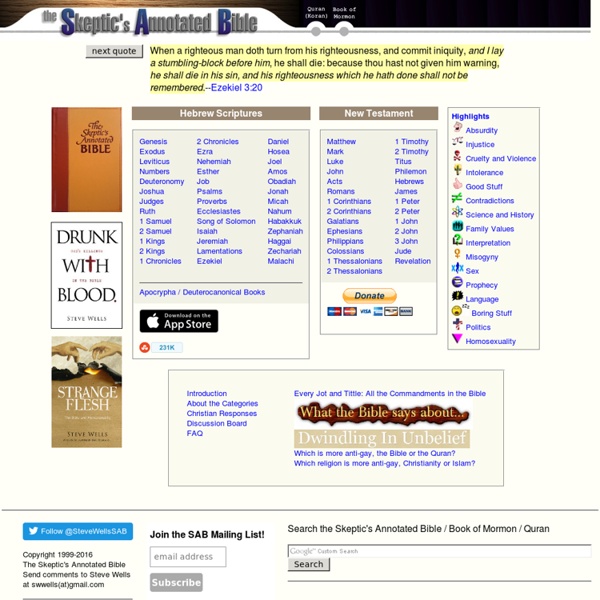



http://skepticsannotatedbible.com/
Leaving Christianity It is not finished moving yet and some links will send you back to the old Leaving Christianity site until the rest of the pages are moved. Not to fear though as the content is the same wherever you end up! Note the nice site navigation on the upper left and the site activity lower left! Knowledge Management as Educational Science Knowledge Management as Educational Science Our brains naturally function systematically, and if we can learn to teach and learn to this biological strength we can become far more effective. Image provided by Walter Smith. Can we create a science of knowledge management that teachers can use to influence learning?
Debating Christianity and Religion - Pressing matters of the day and of all time, debated among thoughtful participants of all faiths Forum | Welcome | Debate Rules | Links | Facebook | Twitter | Donate Civil and engaging debate on Christianity and religious issues FAQ Search Register Log in The time now is Thu Sep 20, 2012 3:11 pm C.F.I. :: Debating Christianity and Religion Forum Index Topics Knowledge Organization Online access ISKO members have right to access the online version after registering at Ergon website. Status and scope Knowledge Organization (ISSN 0943-7444) is the official bi-monthly journal of ISKO. It was founded in 1973 by Dr. Ingetraut Dahlberg, the first President of ISKO, with a consulting board of editors representing the world's regions, the special classification fields, and the subject areas involved.
Knowledge Is a Common Good - Transform Network The Effects of the Open Source Movement on the Development of Politics and Society Introduction In October 2009, Transform! The Law of Accelerating Returns An analysis of the history of technology shows that technological change is exponential, contrary to the common-sense “intuitive linear” view. So we won’t experience 100 years of progress in the 21st century — it will be more like 20,000 years of progress (at today’s rate). The “returns,” such as chip speed and cost-effectiveness, also increase exponentially. There’s even exponential growth in the rate of exponential growth. Within a few decades, machine intelligence will surpass human intelligence, leading to The Singularity — technological change so rapid and profound it represents a rupture in the fabric of human history.
New RAND Research System Gathers, Analyzes Expert Opinions TuesdayJune 14, 2011 Researchers have developed a new method of eliciting and analyzing opinions from a large group of experts and laypeople to aid complex decisionmaking, adapting online and social media technologies to lower the cost of such activities while expanding the types of people who can be queried. The system, called ExpertLens, incorporates elements of such well-known approaches as the Delphi method, the Nominal Group Technique and crowdsourcing that are used to collect opinions about problems or to create forecasts. Convergence of Expert Consensus Through Feedback A discussion of studies directed toward the improved use of expert opinions in operations research. The Delphi method as applied to consensus research is discussed and the results of experiments directed toward convergence of expert opinions presented. This report is part of the RAND Corporation paper series. The paper was a product of the RAND Corporation from 1948 to 2003 that captured speeches, memorials, and derivative research, usually prepared on authors' own time and meant to be the scholarly or scientific contribution of individual authors to their professional fields. Papers were less formal than reports and did not require rigorous peer review.
Improving the Reliability of Estimates Obtained from a Consensus of Experts A report on an experiment in the use of expert opinions. The experiment, involving the Delphi technique and the computation of a consensus based on self-appraised competence ratings, is described and its results analyzed. This report is part of the RAND Corporation paper series. The paper was a product of the RAND Corporation from 1948 to 2003 that captured speeches, memorials, and derivative research, usually prepared on authors' own time and meant to be the scholarly or scientific contribution of individual authors to their professional fields. Papers were less formal than reports and did not require rigorous peer review. Permission is given to duplicate this electronic document for personal use only, as long as it is unaltered and complete.